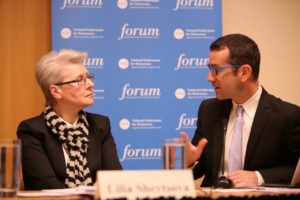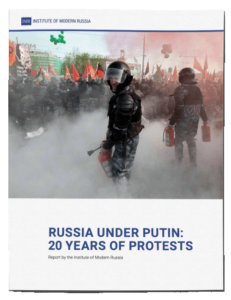
Levada
President Vladimir Putin’s opponents agree a nationwide vote next month that could extend his rule is a sham, but are split over whether to campaign for a “No” vote or call for a boycott. In the July 1 vote, Russians will vote to approve or reject constitutional reforms including a change that would allow Putin to serve two more six-year terms, if re-elected, instead of stepping down in 2024, Reuters reports:
Putin’s approval rating, though still high at 59%, has slipped to its lowest since 1999, the Levada pollster says, and the coronavirus pandemic poses one of the biggest challenges of his more than 20-year rule. Even so, Putin’s opponents believe the outcome is a foregone conclusion. Some, such as politician Alexei Navalny and the liberal opposition Yabloko party, have urged supporters not to vote.
 Putin has always understood that a belt of increasingly democratic, prosperous states around Russia would pose a direct challenge to his leadership model and risk reinfecting his own people with democratic aspirations, notes Victoria Nuland (right), Senior Counselor at the Albright Stonebridge Group and a Nonresident Senior Fellow at the Brookings Institution.
Putin has always understood that a belt of increasingly democratic, prosperous states around Russia would pose a direct challenge to his leadership model and risk reinfecting his own people with democratic aspirations, notes Victoria Nuland (right), Senior Counselor at the Albright Stonebridge Group and a Nonresident Senior Fellow at the Brookings Institution.
This is why Putin was never going to take a “live and let live” approach to former Soviet lands and satellite states, she writes for Foreign Affairs:
Instead, he seized on practically every democratic struggle of the last 20 years—Kosovo’s successful push for independence in 2008, the protests that set off the Syrian civil war in 2011, the Bolotnaya Square protests in Moscow in 2011–12, the Maidan uprising in Ukraine in 2014—to fuel the perception at home of Russian interests under siege by external enemies. For a long time, it worked. Russia’s conquests in Ukraine and Syria were wildly popular at home and deflected attention from its internal problems. With these successes, Putin’s geopolitical appetite grew. He came to believe that democratic states were weak and that Russia could corrode their political systems and social cohesion from the inside.
 The post-Soviet system has demonstrated a phenomenal ability to reinvent itself by dumping the Soviet state and rejecting its role as an alternative to the West. Indeed, the Russian system has adapted to the post-Cold war reality better than liberal civilization, argues Lilia Shevtsova (left), the Richard von Weizsäcker Fellow at the Robert Bosch Academy.
The post-Soviet system has demonstrated a phenomenal ability to reinvent itself by dumping the Soviet state and rejecting its role as an alternative to the West. Indeed, the Russian system has adapted to the post-Cold war reality better than liberal civilization, argues Lilia Shevtsova (left), the Richard von Weizsäcker Fellow at the Robert Bosch Academy.
Yet over the past few years the Russian system has increased its own fragility by falling into traps of its own creation. The most serious threat is that the latest means of reproducing the Russian system have begun to erode one of its central pillars: personalized power, she writes for The American Interest:
The system can’t support itself by means of ideology or massive repressions, as the Communist regime did. The post-Soviet system has been legitimizing itself through elections with guaranteed outcomes. But over time the rigged elections have begun to undermine the system’s stability. The Kremlin’s efforts to justify Putin’s presidency “forever,” coupled with Putin’s signing into law a provision allowing elections and referendums to be conducted by mail and via the Internet, throw into the dustbin the principle of electoral legitimacy, yet there are currently no substitutes for it. The backbone of the personalized system—Russia’s Great Power role—has begun to crack under the burden.
 Shrinking resources and resistance from external powers unwilling to recognize Russia’s areas of influence have limited Russia’s great power mission, Shevtsova adds. Even more important is the fact that the majority of the Russian population has begun to associate Russia’s great power role with economic wellbeing rather than military might.
Shrinking resources and resistance from external powers unwilling to recognize Russia’s areas of influence have limited Russia’s great power mission, Shevtsova adds. Even more important is the fact that the majority of the Russian population has begun to associate Russia’s great power role with economic wellbeing rather than military might.
Some—myself included—have been overly optimistic in expecting that with more integration with the free world, Russia would become a better and more democratic partner, adds Nuland, a board member of the National Endowment for Democracy (NED):
Others have been overly fatalistic, citing Russia’s unique set of interests, its geography, or its history to justify its aggression and violations of international law. Others still have been ahistorical in their outlook, asserting that if NATO just reversed its enlargement and offered Russia hegemony over Ukraine and a larger sphere of influence, Putin’s appetite would be sated. None of these lenses has given U.S. policymakers better vision.
The coming U.S. presidential election offers the United States a chance to get off defense, restore the strength and confidence of the democratic world, and close the holes in its security after years of drift and division. Once that resolve is firmly on display, the United States can seize the moment of renewal at home and stagnation in Russia to stretch out a hand again. Putin may not want or be able to take it. But the Russian people should know that Washington and its allies are giving him and Russia a choice.







